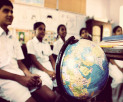International Classroom still ‘very Dutch’
Two bachelor programmes – Computing Science and Industrial Engineering & Management – formed the pilot for the International Classroom in the FMNS faculty. The FMNS pilot is actually a case study of existing practice and both bachelors will continue with the IC until 2019.
Two other pilots of the IC have been conducted so far in other faculties. The IC is a project whose goal is to effectively integrate international perspectives into the curriculum and classroom discussions at the RUG.
‘Still very Dutch’
The report shows that the FMNS bachelor programs clearly adhered to the objectives of the International Classroom, but also identified several areas that could be better. For example, while learning outcomes incorporated broader perspectives, ‘an explicit international orientation is still lacking’, the report says.
That was an issue identified by students in other pilots last year as well. Several testimonials in the ‘Studying in the International Classroom’ booklet, published in 2014, stated that non-western case studies and academic theories were rarely used.
Staff member conduct in the pilots was also identified as something that could stand to become more international. ‘The academic culture/environment at FMNS is still very Dutch, according to many of the interviewees. Staff and students need to become more aware of this inherent ‘Dutch-ness’ and reflect on their communication and behaviour.’
Becoming more diverse
That includes language. While English is the official language in the IC pilots, some course materials are not available in English. ‘There were a few complaints from students in the first year about examples of exams or exam regulations being available in Dutch only.’ However, the level of English being spoken in the classrooms can also vary, since instructors and students are typically speaking it as a second language.
The report also identifies the tendency to switch to Dutch in some programs ‘because of the relatively low number of international students in most programs and the limitations in English language skills amongst students.’
Although there may not be very many non-Dutch students, the report recognises that the student population is at least becoming ‘more diverse in terms of educational and cultural background.’
In transition
The report also states that opportunities for instructors to spend time abroad themselves were limited. ‘International staff exchange is often hindered by capacity problems.’ Creating more space in curricula to enable students and staff to exchange within programmes was suggested as a solution.
Non-Dutch staff is also underrepresented in boards and committees, and the IC pilot programmes are tasked with taking the initiative to increase their numbers. ‘The overall picture is very much of a faculty and people in transition, currently still in a stage of raising awareness, but heading for deliberate changes’, the report concludes.






